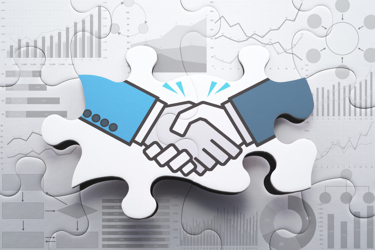Do Your CDMO And Consultants Get Along? They Better

By Louis Garguilo, Chief Editor, Outsourced Pharma

Years ago while working at a CDMO, I didn’t always appreciate the consultants attending our meetings with biopharma clients.
Some consultants, shall I say, seemed to be paid by the word more than by the value added. In those cases, I saw how they might have ended up negatively impacting relationships among all three parties – consultant, CDMO, and biopharma client.
Thankfully, we never did get to that point.
And I’m certain at times consultants were legitimately concerned we as the CDMO needed to be reminded of some critical data or other components of the development or manufacturing process.
Nonetheless, it was clear how quickly friction between consultant and CDMO could detract from the working trust, and even impair the ability to keep our collective eyes on what was best for the project and biopharma customer.
Nowadays, says Evelyn Kelly, founder and managing director, Orphan Drug Consulting Ltd., “These relationships are even more important as biopharma companies get more virtual.”
“Organizations are leaner,” she iterates via a Microsoft Teams discussion from her “home” office in Dublin, Ireland. “It's very much a world where you have a smaller number of employees in the clients’ organizations, so the consultant-CDMO relationship is really key to your success.”
A “Relational” Triangle
Before forming her consultancy, Kelly hired her share of both consultants and CDMOs during a career spanning supply-chain roles at companies such as Shire (now Takeda) and PTC Therapeutics.
 “I've been there as well,” she says regarding my past displeasures with consultants. “In a meeting room where there’s a consultant, and you think, ‘Just get this person out of here.’ So I hear you.”
“I've been there as well,” she says regarding my past displeasures with consultants. “In a meeting room where there’s a consultant, and you think, ‘Just get this person out of here.’ So I hear you.”
How, then, I ask her, does the biopharma client respond to that CDMO’s displeasure with their consultant?
“First of all, if your CDMO is giving you that kind of feedback, listen to them,” she replies with a laugh.
She then immediately notes her advice can fall the other way: the consultant informing you your CDMO is not performing up to snuff, or living up to the letter and spirit of contracts and relationships.
Again, she advises, take that feedback seriously.
And there are additional forms of the type of “relational feedback” you may receive – from either your consultants or CDMOs.
If, for example, your consultant is giving you an earful regarding you or your staff’s behavior towards a CDMO, “you may not want to,” says Kelly, “but definitely listen to that as well.”
“If a client is being difficult, or asking for something that’s not feasible,” she explains, “even though they are paying us, I will support the CDMO’s position.”
“I had one scenario about a year ago,” she continues. “There was a resource at a CDMO I really trusted. He was recommending to our client a particular type of glue for serialization purposes.”
“Somebody at the client biopharma, well, dissed him.
“I spoke up. I said I’ve known this professional for years. I've worked with him on perhaps fifteen projects. He's never given us bad guidance. So I think you should strongly consider accepting his advice.”
But even given her strong stance, Kelly reminds us that hers can only be taken as advice by the client: The final decision must be theirs.
“I’ll even state, ‘It's your dime.’ Sometimes you actually have to remind your clients they are paying the bills for what they want to do.”
Kelly says that if a program sponsor wants to spend more time and money exploring something – even if both the CDMO and consultant don’t believe it will derive value – then the CDMO and consultant should ultimately accept that, and readily support the client in that part of the journey.
“Because that's just what people want to do sometimes. And I get that. I’ve been that person at the client in the past; I had to see for myself.”
Leave It Up To Them
Orphan Drug Consulting works with various CDMOs, and, according to Kelly, maintains excellent relationships with them.
“I pride myself on that,” she says. “We’re very mindful to maintain that relationship, and make sure it is on good footing.”
Which leads to this best practice for biopharma organizations:
Let your consultants and CDMOs interact independently on your behalf, while you focus on what you need to.
She gives the following example, this time between her consultancy and a 3PL the biopharma client was hiring. (3PL are third-party logistics organizations supporting your shipping/transportation, warehousing, and other aspects of your supply-chain integration and material and product distribution.)
“We informed our biopharma client we needed to have a call with the 3PL they had selected. I wanted to clear up a couple of things, and I would keep them [the client] posted.
“We then had a productive one-to-one call. When it was over, I simply reported to the client we had the call, and everything was on track.
“You know,” Kelly says drawing out her lesson, “it really helps to smooth things over if the client allows the relationships they have chosen to work together like that.
“Particularly, I believe this is what virtual and small biotechs should look for – scenarios where the consultant, the CDMO, and all partners have good enough or existing relationships where they can work collaboratively on the client’s behalf.”
